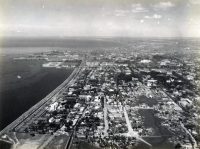(*Dated only as December, but from the context of the entry, likely two days after December 8, 1943)
Three December 8’s have passed. How many more, I wonder. Will we ever waken to a town free from vermin,
vermin clad in dirty khaki who drag their feet in the boots to which they are so obviously unaccustomed, and who wear those hideous eyeglasses? One way to win the war might be to steal all their spectacles. But they surely can, and do, fight!
I hate them increasingly. I resent being pushed around—I got a real pushing yesterday. Mary so wanted
to get the photographs of her son and her husband; she mourned those photographs more than all her lovely
cars and her beautiful house she had lost. Fred got permission from the Camp Commandant for me to get them from the house she had lived in before the Japanese newspaper dispossessed her and I took her to my house. So I went down there, on the bicycle. After a couple of trips I finally found the man who could do
something for me. I had a lengthy discussion with him. He was difficult, although his English was fair; but he had a boil on his neck. He insisted the pictures could not be there. I insisted they must be, saying I knew exactly where they had been left. He finally telephoned Santo Tomas and spoke with the Commandant there.
After a long conversation in Japanese, the Commandant asked to speak to me. The Commandant said the newspaperman claimed the house had been occupied by the military before the newspaper moved in, so that they had nothing there. Unfortunately I contradicted that statement, saying I myself had taken Mary from the
house as the newspaper people, these same ones, were moving in, and that the military had never been there;
that I was sure I knew where the photos were, if I could only look for myself. Quite obviously this was the wrong thing to say, it made the newspaperman lose face. So we continued arguing. Just then a Filipino boy brought an armful of framed photographs into the office, beaming with pride (I had subsidized him beforehand). The Jap showed them to me, and asked if those were the pictures I was looking for. I looked. They were all endorsed photographs of past governors-general, high commissioners, and a snappy little Sultan of Sulu job, all with a sort of love to E.D.H. endorsement on them. E.D.H. having occupied the house previous to Mary and Fred. He was a government official and had gone to Corregidor with the High Commissioner.
I foolishly admitted I knew who the photographs were, and who E.D.H. was, but insisted I wanted Mary’s photos, not those. To close the argument, the Japanese threw them all at me across his desk, the poor little
sultan falling on the floor and breaking. He forced me to get down on my hands and knees to pick them all up,
even to the bits of broken glass, prodding me with his toe. Then he took me by the shoulders, marched me to
the door—me staggering under all the past rank of the Philippines—pushed me heartily downs the steps, and
told me in good University of California English to get the H … out of here, to stay out, and that he personally
would see to it that I should never again bother any representative of his Celestial Highness. Exquisite Japanese courtesy—and typical of the little yellow swine.
I was more mad than scared. I mounted my Green Dragon, pictures in the box in the rear, and roared off down the street at a pace that would have won me the six-day bicycle race in half a day, I’m sure!
I arrived home completely enraged and with a pair of horribly battered knees. For of course I fell off, and right
in some horrible stuff. My French friend called the doctor who gave me tetanus shots.
Two days later, still in bed. So many people came in to sympathize with me, all laden with something to cheer me up—mostly rum. Nobody told me that tetanus shots and rum were an evil mixture. I nearly died. I think I am going to have whatever anti-tetanus shots are supposed to prevent. I definitely feel I am dying.
